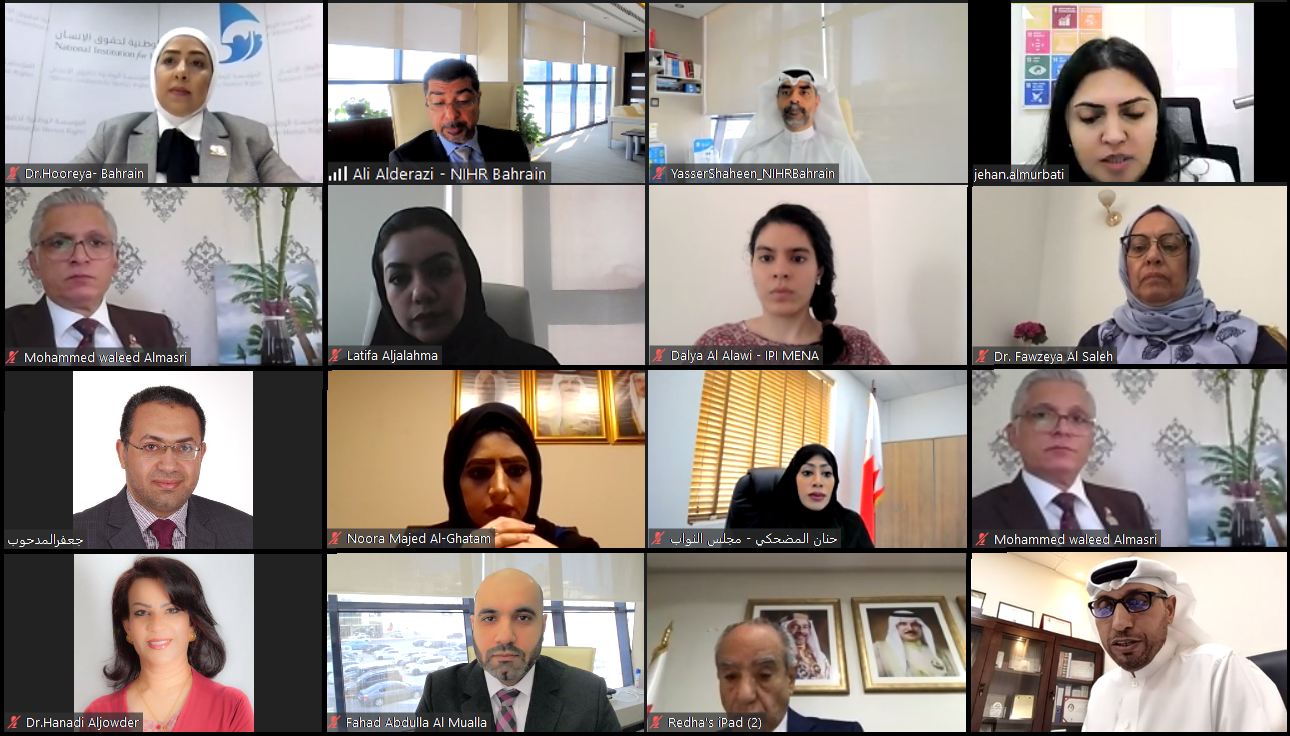NIHR Organizes a Round Table on the Extent of Compatibility of Urban Planning with the Right to a Healthy and Sustainable Environment in the Kingdom of Bahrain

The National Institution for Human Rights (NIHR) organized a round table entitled “The Extent of Compatibility of Urban Planning with the Right to a Healthy and Sustainable Environment in the Kingdom of Bahrain” for a number of official bodies and relevant civil society institutions in the Kingdom of Bahrain by videoconference, which was moderated by Dr. Fawzeya Al-Saleh, Head of the NIHR Committee on Public Rights and Freedoms, in order to highlight the right to live in a safe, clean, healthy and sustainable environment.
The event was opened by Eng. Ali Ahmed Al-Derazi, Chairperson of the NIHR, by welcoming the participants and speakers, and gave an overview of the role of the NIHR in the area of promoting and protecting the right to a healthy and sustainable environment, praising the constructive cooperation between the NIHR and all relevant partners to achieve common goals to promote the right to a healthy environment, being one of the basic requirements for human rights.
In his opening speech, Al-Derazi explained that rapid urban development constitutes a global challenge that requires us to unite and unify efforts in order to provide a healthy and suitable environment for everyone to achieve the goals of sustainable development 2030, noting at the same time the efforts of the Kingdom of Bahrain to protect the environment.
The first session included five main themes that dealt with the reality of urban planning and its impact on the right to a healthy and sustainable environment in the Kingdom of Bahrain. Engineer Lama Abbas Al-Mahroos, Acting Director of the Environmental Control and Protection Department at the Supreme Council for Environment, presented in the first theme an overview of the role of the Supreme Council for Environment in the area of urban planning to ensure the protection of the environment and wildlife in the Kingdom of Bahrain and the most important legislation and laws regulating thereof.
In the second theme, Mrs. Waheeba Ali Muhammad Abdullah, Head of the Planning and Technical Services Department at the Ministry of Works, Municipalities Affairs and Urban Planning, explained the most important urban planning strategies used to maintain the ecological balance and wildlife in the Kingdom of Bahrain.
In the third theme, Eng. Reda Muhammad Al-Adraj, Assistant Undersecretary for Housing Projects in the Ministry of Housing, focused on the most important construction requirements approved by the Ministry of Housing to harmonize urban planning with the right to provide a healthy and sustainable environment for all, and the most important projects thereof.
In the fourth theme, Eng. Issa Abdurrahman Al Buainain, Urban Strategic Planning Advisor at the Urban Planning and Development Authority, presented a brief on the most important standards adopted in urban planning, which are consistent with providing a healthy and sustainable environment for all.
In the fifth and final theme of the first session, Dr. Wafaa Ibrahim Al-Sharbati, Director of the Health Promotion Department at the Ministry of Health, focused on the role of the Ministry of Health in harmonizing urban planning with the right to a healthy and sustainable environment for all.
The second session focused on the role of civil society institutions and their importance in introducing and raising awareness of the importance of urban balance to preserve the environment, being essential partners in the promotion, development and protection of human rights in the Kingdom of Bahrain, where Dr. Intesar Al-Bannaa, Member of the Board of Directors of Mabadea Society for Human Rights, and Dr. Hanadi Al-Jowder, Vice-Chairman of the Board of Environment Friends Society, gave an overview of the most important activities undertaken by civil society institutions to promote and protect the human right to a healthy environment.


